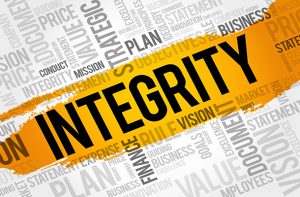 When some lawyers think of “due diligence,” they picture boxes and boxes of contracts, financial records, and other documents that need to be reviewed before entering into a transaction. It might not be a fun process, especially for junior associates at large law firms, but it is a crucial one.
When some lawyers think of “due diligence,” they picture boxes and boxes of contracts, financial records, and other documents that need to be reviewed before entering into a transaction. It might not be a fun process, especially for junior associates at large law firms, but it is a crucial one.
Due diligence often focuses on the financial, but it goes well beyond the numbers. And in this day and age, innovative technology has made due diligence a much faster, easier, and more accurate process — a far cry from when it involved pawing through dusty documents in a windowless conference room.
A critical part of the due diligence process today is integrity due diligence (“IDD”). This process exceeds the scope of strictly financial matters, but is no less important.
“If a company is trying to conduct business in a new country or different market, this company might have to rely on external third parties, such as sub-contracted employees, vendors, or joint-venture partners,” explained Victor Padilla, a director with RSM US LLP. “To avoid potential reputational damage, the company needs to make sure that these third parties are conducting business in appropriate ways, which is what IDD is all about.”
“The idea of conducting due diligence and third parties isn’t new,” observed Greg Naviloff, also a director with RSM. “For example, if you’re doing business with another entity, you want to be sure that they can pay you. So you do your due diligence on that entity upfront to learn their payment history with other businesses, and determine if you want to do business with the entity before you sign an agreement.”
But today, integrity due diligence matters more than ever. Part of this is because of the increased emphasis on compliance in the wake of the Great Recession, the Dodd-Frank Act, and its focus on proper corporate governance. And part of this is because of ramped-up enforcement of anti-corruption laws — not just the U.S. Foreign Corrupt Practices Act, but newer legislation from around the world, in countries ranging from the United Kingdom to Mexico to China to Brazil.
Integrity due diligence is a complex and multifaceted process, as Naviloff told me. Some of the related questions you want to ask include: “Has the third party been in trouble with the law before? Has it been accused of corruption? Does the organization have an anti-corruption program? If so, how robust is the program? The answers to these and other questions might drastically change how you do business with a third party — or whether you do business with them at all.”
There are various levels of IDD that can be conducted depending on the risk, ranging from a basic check or screening based on free public databases to more developed diligence using proprietary tools and discreet source inquiry. And in this age of Big Data, analytics can be used to streamline and enhance the process.
“We had a client dealing with a high-profile case involving payments to a company,” said Padilla, providing an example of his company’s work in the area. “As we started applying analytics to transactions around this company, we started identifying payments that didn’t seem to be immediately connected to the company’s stated business purpose. When we started seeing donations to rugby sports clubs, film festivals, and other activities seemingly unrelated to the core business of the company under analysis — payments totaling millions of dollars — the analytics led us to take a closer look at the recipients of these payments, which subsequently resulted in significant findings within the context of the due diligence.”
Analytics can help with integrity due diligence in other ways as well. For example, as Naviloff told me, analytics can help a company prioritize and rank which investigative techniques it should use for conducting IDD, as well as which entities to subject to higher scrutiny.
Finally, as Naviloff underscored, “IDD is not a ‘one and done’ process. It involves continual screening of third parties with whom you have ongoing relationships, including monitoring and watch lists.”
Integrity due diligence can be conducted on many different levels and in many different ways. It will vary depending on such factors as the country, industry and company involved. But one thing is certain: given the legal, regulatory, and reputational risks facing companies today, inaction is not an option.